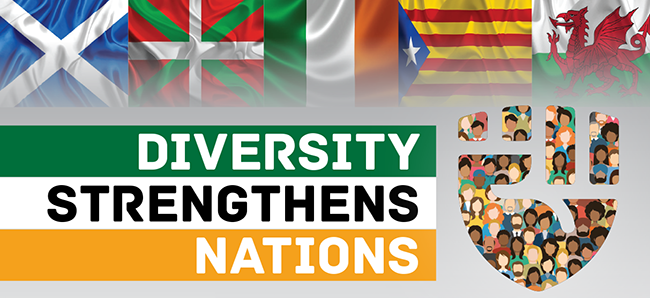4 August 2022 Edition
Diversity strengthens nations

How we understand politics, nationalism, and patriotism is often defined by a country’s history, its politics, and its political leaders. It is sometimes glibly claimed that patriotism is the love of your country whilst nationalism is the hatred of everyone else’s.
Nationalism can be in in many instances a positive thing. However, when it is mixed with economic malpractice, fear mongering or scapegoating and used to pitch people against each other, it becomes a negative force. There are plenty of examples in history, many sadly recent.
Many of the left in Europe have been influenced by this perception, seeing nationalism in pejorative terms, as being narrow and insular with a sole focus on one’s own national interests and to the exclusion or detriment of the interests of other nations.
Nationalism turns bad when it is fuelled by regressive, socially divisive, and economically discriminatory politics.
There is no doubt that some parties and governments in Europe have exploited a version of nationalism that fits that description. They seek to deflect blame for their own political shortcomings by pretending that there are simple answers to complex national issues and that their failures are someone else’s fault, vis-à-vis the foreigner, the outsider.

Negative nationalism is stoked by politicians on the far right who propagate xenophobic and racist hate to create division in order to garner political support for their ideological interests above the real national interests.
Common contemporary examples of this include the BNP, AFD, True Finns, La Pen’s Front National, Orbán’s Fidez, and the English Defence League. Historical examples include Nazism and various white-power groups in the USA.
We have seen some within loyalism in the Six Counties linking up with British-based far-right groups, while in the 26 Counties the so-called Irish National Party and Irish Freedom Party have attempted to stir up bigotry.
Take these examples of nationalism, verging on fascism that exist in Europe today and the themes they share. Orbán’s xenophobic remarks about the “mixing of European and non-European races”, the British Tory government’s Brexit anti-migrant stance and it seeking to blame the EU for its own economic failures, and a rising racially motivated extreme right in central and Eastern Europe, reinforce this point.
We also see this clearly in response to the humanitarian crisis at Europe’s borders, as right-wing leaders, masquerading as nationalists, erect border fences to keep desperate refugees out and use far-right anti-migration rhetoric as their main talking point. They frequently give a nod to the ‘Great Replacement’ conspiracy theory, which claims there is a plot to dilute the white population of the US and European countries through immigration. This is nationalism at its worst; insular, unconfident, and inhumane.
However, nationalism, despite the language of some, is not universally a negative force. Progressive nationalism is a growing force in Europe. Diversity strengthens nations; it does not weaken them.
For the most part, in Europe, nationalism is a force for good. Progressive nationalism as pursed by Sinn Féin is the vaccine against the far right.
Progressive nationalism that transforms systems of repression and oppression should be embraced by those on the left and centre-left as a means to counter the simplistic and xenophobic politics of the far right.
It can unite people of all faiths, ideologies, and socio-economic circumstance in pursuit of noble causes, principally the right to self-determination, national democracy, independence, human rights, and equality.
Progressive nationalism, in many cases, is a reaction to oppression, occupation or injustice. Parties that pursue independence and autonomy are on the march and they are not regressive, insular, or right-wing.
So, we need to make a clear distinction between regressive, almost fascist nationalists and those who promote progressive nationalism. In Ireland, Scotland, the Basque country, Cataluña, and Wales, progressive independence and nationalist movements are growing
Sinn Féin is the voice of the progressive independence movement in Ireland. The party has grown rapidly in recent years. Sinn Féin is in government in the north of Ireland with a First Minister elect and leads the opposition in the south of Ireland.
In Scotland, the progressive nationalists of the SNP have also grown rapidly. They secured the holding of a referendum on Scottish independence in 2014. Whilst they narrowly lost the 2014 referendum, they have since expanded politically and First Minister Nicola Sturgeon announced a few weeks ago that she would be seeking the Section 30 provision to be triggered for Scotland to hold a second referendum.

In Wales, Plaid Cymru are the largest voice of progressive nationalism with MPs, Welsh Assembly Members, and nearly 200 councillors. Nationalist movements in the regions of the so-called ‘UK’ all opposed Brexit. They were opposed to national isolationism, erecting borders, and insular national politics.
In the Basque Country, the peace strategy of EH Bildu is also bearing fruit. EH Bildu has consistently polled well since its formation in 2011 and it stands on a shared platform of progressive Basque nationalists and left wingers.
In Cataluña, I stood shoulder to shoulder with the Catalan people during their referendum called by the Speaker of the Catalan Parliament Carme Forcadell and I witnessed the Spanish Guardia Civil smash heads and subsequently imprison nationalist leaders including the Speaker who we subsequently visited in jail.
These progressive nationalists confidently support membership of the European Union whilst striving to protect the interests and independence of their country. They critically engage with the EU and believe another Europe is possible
Pro-independence left parties are progressively nationalist and internationalists. They transform systems of oppression and repression in a world where false pseudo-divisions are over emphasised by far-right wing governments, parties, and politicians.
If the left does not embrace progressive nationalism and differentiate between it and jingoistic regressive nationalism, masquerading as a negative patriotism, they will leave that ground for fascists to occupy and for fascism to grow.
• Martina Anderson is the Sinn Féin representative in Europe




